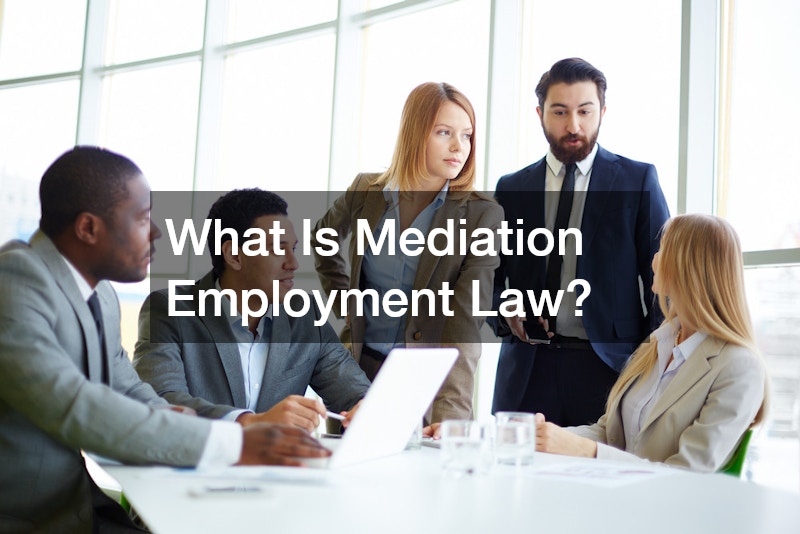Mediation in employment law refers to a form of alternative dispute resolution (ADR) used to resolve conflicts between employees and employers without the need for formal litigation. It involves a neutral third-party mediator who assists both parties in reaching a mutually agreeable solution. The process of mediation in employment law is voluntary, confidential, and often less time-consuming and costly than traditional court proceedings.
The Role of Mediation in Employment Disputes
In the workplace, conflicts may arise over various issues such as discrimination, harassment, wrongful termination, wage disputes, or violation of employment contracts. When these disputes occur, litigation can be an expensive and lengthy process, which is why many individuals and companies turn to mediation as a way to settle the matter.
Mediation is an effective tool in employment law because it focuses on collaboration and compromise. Unlike in court where one party typically wins and the other loses, mediation aims to achieve a solution that satisfies both parties. This makes it a preferred method of dispute resolution for many employees and employers alike.
How Mediation Works in Employment Law
Mediation typically follows a structured process designed to facilitate communication and negotiation between the parties. The following steps outline how the mediation process works in employment law:
Choosing a Mediator: The first step in the mediation process is selecting a mediator. The mediator is usually a trained professional with expertise in employment law. This neutral third-party does not have the power to make decisions or enforce settlements but helps both parties communicate and find common ground.
Initial Meeting: During the mediation session, the mediator will introduce themselves and explain the process. Each party is given the opportunity to present their case and express their concerns without interruption. The mediator ensures that the conversation remains respectful and constructive.
Private Caucus: Often, the mediator will meet with each party separately in a private session, known as a caucus. In this private setting, the mediator can speak more openly with each party and discuss possible solutions without the pressure of the other party present. The mediator may also explore the underlying interests and emotions behind the dispute, which can help shape the resolution.
Negotiation: Following the private caucus, the mediator may bring both parties together to negotiate a resolution. This is the stage where both parties can explore potential compromises, with the mediator offering suggestions or proposing options that might resolve the dispute. The mediator’s goal is to guide the conversation toward an agreement that both sides are comfortable with.
Settlement Agreement: If the parties reach a mutual agreement, the mediator will help draft a written settlement agreement. This document outlines the terms of the resolution, such as financial compensation, behavioral changes, or any other agreed-upon actions. Both parties sign the agreement, and it becomes legally binding.
Follow-Up: In some cases, a follow-up meeting may be scheduled to ensure that both parties are adhering to the terms of the agreement. The mediator may also assist with resolving any issues that arise after the agreement is made.
Benefits of Mediation in Employment Law
Mediation has several key advantages for both employees and employers. Below are some of the primary benefits of using mediation to resolve employment disputes:
Cost-Effective: Mediation is typically much cheaper than litigation. Legal fees for a court case can quickly add up, whereas mediation is a more affordable option. Additionally, the process is usually quicker, which saves both parties time and money.
Confidentiality: One of the major appeals of mediation is its confidentiality. Unlike a public court case, the mediation process is private, and any information disclosed during the proceedings cannot be used in future legal actions. This allows both parties to speak freely and work toward a resolution without fear of public exposure.
Control and Flexibility: In mediation, the parties involved have more control over the outcome. The mediator helps facilitate communication and negotiation, but the decision-making power remains in the hands of the parties. This level of control is especially beneficial when both sides want a mutually agreeable solution. Moreover, mediation is flexible in terms of time, location, and process, making it easier for both parties to schedule sessions at their convenience.
Preservation of Relationships: Employment disputes can strain relationships between employees and employers. Mediation encourages open dialogue and helps preserve working relationships. Unlike adversarial court battles, where animosity can build, mediation fosters collaboration and mutual respect.
Higher Satisfaction Rates: Research has shown that mediation often results in higher satisfaction rates for both parties compared to litigation. This is because the parties have more involvement in the resolution process, and the outcome is more likely to be acceptable to both sides.
Common Types of Employment Disputes Resolved Through Mediation
Mediation is used to resolve a wide range of employment-related disputes. Some of the most common types of cases handled through mediation in employment law include:
Discrimination: Employees who believe they have been discriminated against on the basis of race, gender, age, disability, religion, or other protected characteristics can use mediation to resolve their complaints. Mediation allows the employee and employer to address the issue in a less formal setting than a court trial.
Harassment: Claims of workplace harassment can also be addressed through mediation. The mediator can help both parties understand each other’s concerns and work out a solution that prevents further harassment.
Wrongful Termination: Employees who feel they have been wrongfully terminated can use mediation to resolve the issue with their employer. This could include situations where an employee claims they were fired for discriminatory reasons, retaliation, or breach of contract.
Wage Disputes: Mediation can help resolve disputes related to unpaid wages, overtime, or violations of wage laws. Both parties can negotiate a fair settlement without the need for court intervention.
Contract Disputes: If there are disputes regarding the terms of an employment contract, mediation provides a way for both sides to clarify their positions and reach a solution that meets both parties’ needs.
Watch the video above to learn more about mediation employment law!.



